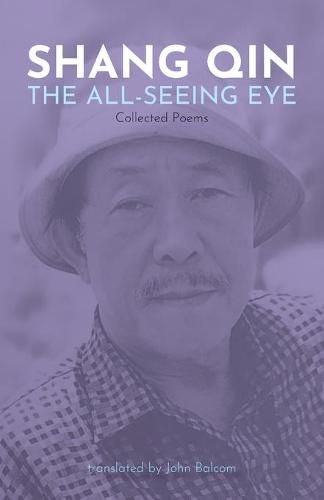Readings Newsletter
Become a Readings Member to make your shopping experience even easier.
Sign in or sign up for free!
You’re not far away from qualifying for FREE standard shipping within Australia
You’ve qualified for FREE standard shipping within Australia
The cart is loading…






This title is printed to order. This book may have been self-published. If so, we cannot guarantee the quality of the content. In the main most books will have gone through the editing process however some may not. We therefore suggest that you be aware of this before ordering this book. If in doubt check either the author or publisher’s details as we are unable to accept any returns unless they are faulty. Please contact us if you have any questions.
Shang Qin (1930-2010) is widely considered one of the most influential and original modern Chinese poets. His critical acclaim was earned not only as a modern master of the prose poem but also as one of Taiwan’s leading surrealist poets.
Taiwan in the 1950s saw the beginnings of a broad, eclectic search for new poetic models and varieties of modernism. This gained momentum and progressed through the 1960s, growing into a modernist movement. During this boom period for poetry, some of the leading Chinese poets of the second half of the twentieth century and beyond emerged: Lo Fu, Ya Hsien, and Yang Mu, to name just a few. Shang Qin, also one of the giants of the movement, came to prominence during this period; his first collection of poetry Dream or Dawn, published in 1969, has been hailed as a landmark of Chinese surrealism. The poet Ya Hsien dedicated his poem For a Surrealist to Shang Qin, and the label stuck. Shang Qin always found the surrealist label too restrictive and once commented wryly: I am not a surrealist; I am a super-realist or an uber-super-realist. One of the hallmarks of his work was his preference for the prose poem, and his impact on the composition of modern Chinese prose poem is unquestionable. However, Shang Qin has noted: I use prose poetry to create; I do not create prose poetry. The focus is the poem; it has nothing to do with prose. Therefore, while critics and academics are inclined to categorize, Shang Qin has always resisted this, adamant about his creative independence.
Shang Qin published five collections of poetry: Dream or Dawn (1969), Dream or Dawn and Others (1988), Thinking with My Feet (1988), The Millennium Collection (2000), and Complete Poems (2009). The present volume, The All-Seeing Eye, is a complete translation of his 2000 volume, which includes poems from his first three collections as well a substantial selection of previously unpublished verse. This book is the largest selection of his poetry available in English.
The collection is a valuable resource for scholars, students, and general readers interested in Taiwan literature, modern Chinese literature, modernism, surrealism, comparative literature, and world literature.
This book is part of the Cambria Literature from Taiwan Series, in collaboration with the National Museum of Taiwan Literature and National Taiwan Normal University.
$9.00 standard shipping within Australia
FREE standard shipping within Australia for orders over $100.00
Express & International shipping calculated at checkout
This title is printed to order. This book may have been self-published. If so, we cannot guarantee the quality of the content. In the main most books will have gone through the editing process however some may not. We therefore suggest that you be aware of this before ordering this book. If in doubt check either the author or publisher’s details as we are unable to accept any returns unless they are faulty. Please contact us if you have any questions.
Shang Qin (1930-2010) is widely considered one of the most influential and original modern Chinese poets. His critical acclaim was earned not only as a modern master of the prose poem but also as one of Taiwan’s leading surrealist poets.
Taiwan in the 1950s saw the beginnings of a broad, eclectic search for new poetic models and varieties of modernism. This gained momentum and progressed through the 1960s, growing into a modernist movement. During this boom period for poetry, some of the leading Chinese poets of the second half of the twentieth century and beyond emerged: Lo Fu, Ya Hsien, and Yang Mu, to name just a few. Shang Qin, also one of the giants of the movement, came to prominence during this period; his first collection of poetry Dream or Dawn, published in 1969, has been hailed as a landmark of Chinese surrealism. The poet Ya Hsien dedicated his poem For a Surrealist to Shang Qin, and the label stuck. Shang Qin always found the surrealist label too restrictive and once commented wryly: I am not a surrealist; I am a super-realist or an uber-super-realist. One of the hallmarks of his work was his preference for the prose poem, and his impact on the composition of modern Chinese prose poem is unquestionable. However, Shang Qin has noted: I use prose poetry to create; I do not create prose poetry. The focus is the poem; it has nothing to do with prose. Therefore, while critics and academics are inclined to categorize, Shang Qin has always resisted this, adamant about his creative independence.
Shang Qin published five collections of poetry: Dream or Dawn (1969), Dream or Dawn and Others (1988), Thinking with My Feet (1988), The Millennium Collection (2000), and Complete Poems (2009). The present volume, The All-Seeing Eye, is a complete translation of his 2000 volume, which includes poems from his first three collections as well a substantial selection of previously unpublished verse. This book is the largest selection of his poetry available in English.
The collection is a valuable resource for scholars, students, and general readers interested in Taiwan literature, modern Chinese literature, modernism, surrealism, comparative literature, and world literature.
This book is part of the Cambria Literature from Taiwan Series, in collaboration with the National Museum of Taiwan Literature and National Taiwan Normal University.